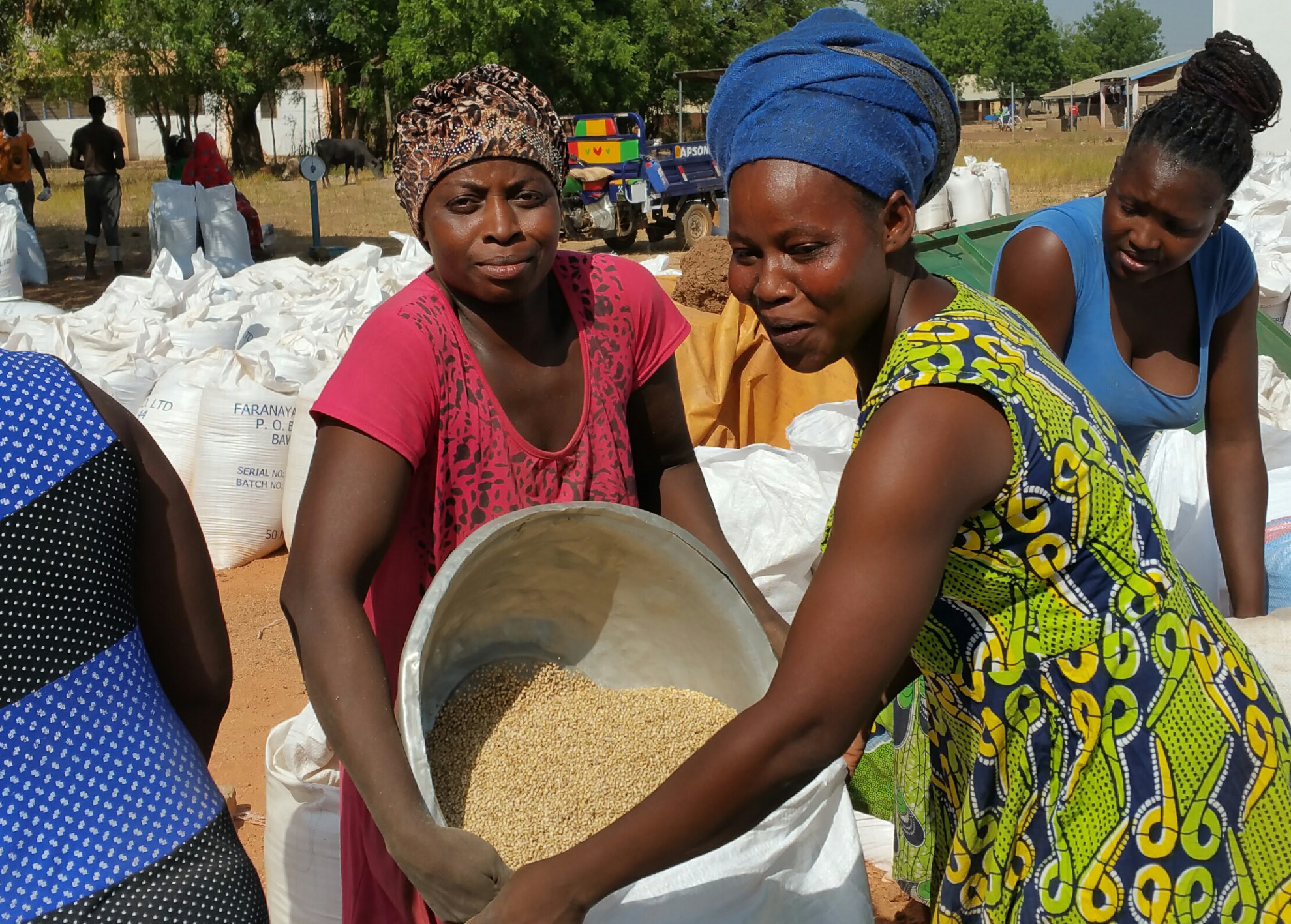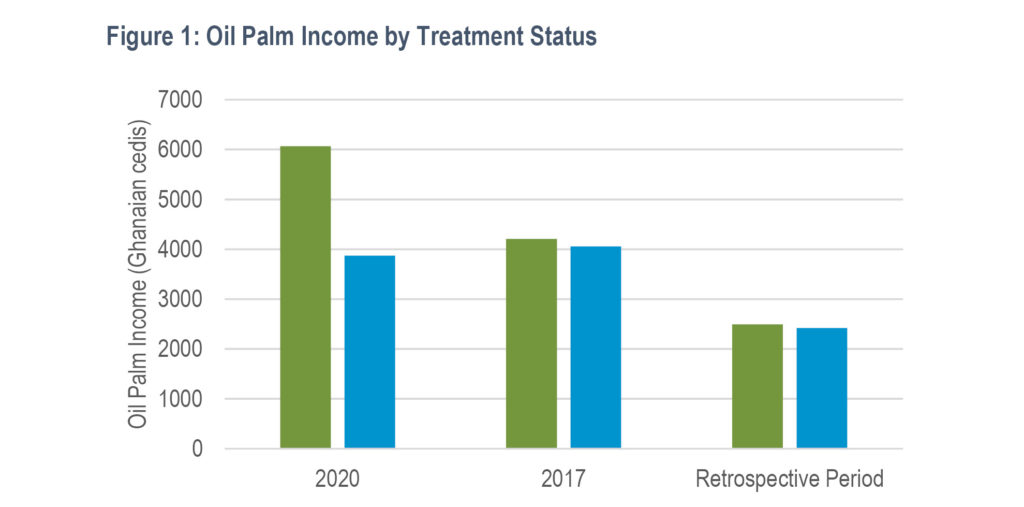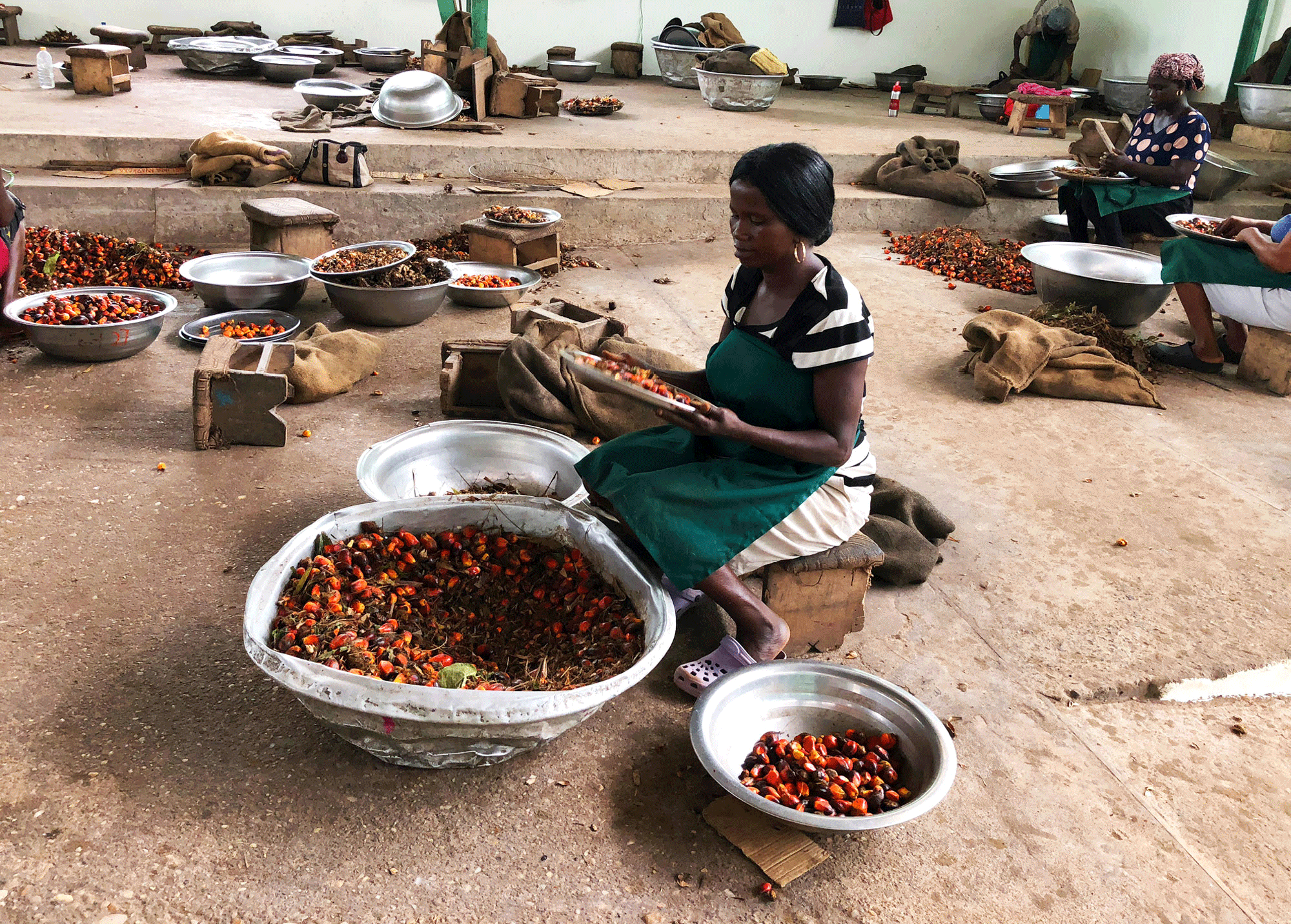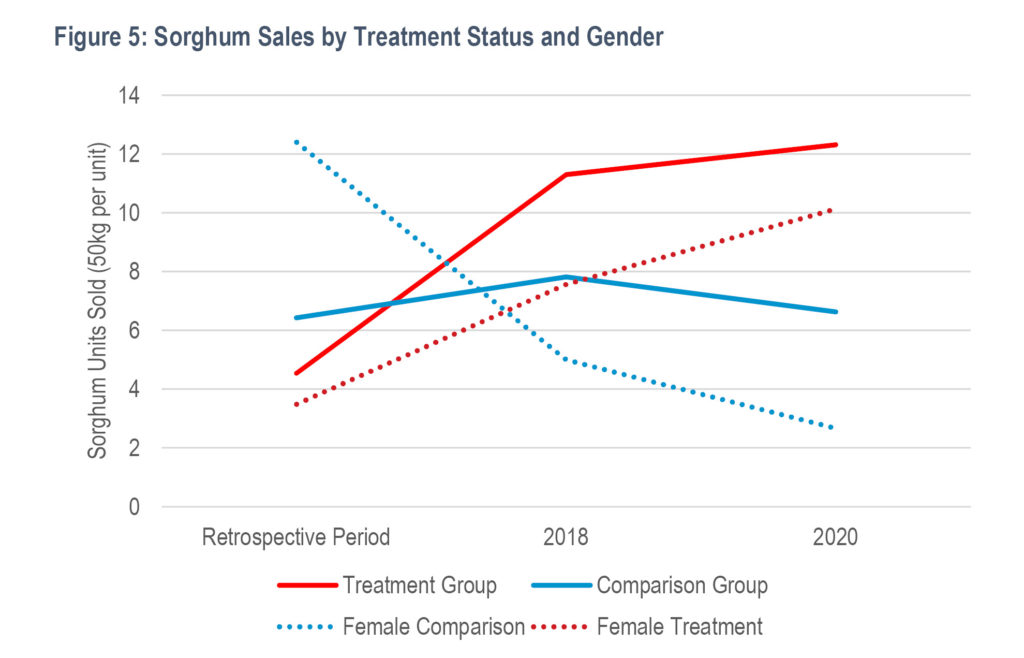
Note: Click here to learn more about how we conduct impact studies in rural communities.
In Ghana’s Eastern Region, the world’s first organic- and Fair Trade-certified oil palm enterprise, Serendipalm, sources oil palm fruit from over 500 smallholder farmers. Eight hundred kilometers north, in the Upper East Region, a sorghum aggregator called Faranaya purchases grain from close to 3,000 farmers. Two different businesses growing different crops hundreds of kilometers from each other, but both have one thing in common: They’re boosting incomes and expanding opportunities for farming families.
Root Capital has worked with Serendipalm and Faranaya for almost a decade, providing both credit and capacity building services. With the support of the Mastercard Foundation, we conducted deep-dive studies to measure the impact of these Root Capital-supported businesses on their farmers. Our Serendipalm study-one of our most rigorous to date-utilized a quasi-experimental approach to estimate the impact of affiliation with Serendipalm on member wellbeing, relative to a group of statistically comparable, unaffiliated farmers. Our Faranaya study observed impacts over time among Faranaya farmers, as well as among unaffiliated sorghum farmers in the region. Read on for some of our key findings.
DID YOU KNOW? Sorghum is used to make syrup and beer, namely pito, which is used during social and religious gatherings in the country. The fruit from oil palm trees produces crude palm oil, an ingredient often found in packaged foods and bath products.
Increased Productivity = Higher Incomes and More Jobs
According to our findings, farmers affiliated with Seredipalm and Faranaya were more productive and profitable than comparable farmers who were not affiliated with a Root Capital client. The collective successes of our clients mean greater stability for farming families, as well as prosperity for entire communities through job creation and off-farm services. Let’s dive a little deeper.
Our study found that Serendipalm farmers produced 32% more kilos of oil palm during a typical high season month and 107% more kilos during a typical low season month than non-affiliated farmers in 2020. Stronger performance among Serendipalm farmers was driven largely by their productivity per acre; they were more likely than comparison farmers to engage in improved water retention techniques, particularly during the low season, such as applying mulch to prevent runoff. These techniques were adopted with the help of the enterprise’s technical assistance team (more on that below).
Over the course of our seven-year study, Faranaya farmers increased sorghum production by 98% and sales by 54%. We observed no significant change in production or sales for unaffiliated farmers over the same period. This growth occurred against the backdrop of a severe drought and an armyworm outbreak in the region from 2017 to 2020. Faranaya farmers were able to recover from these challenges and grow with the unwavering support of their enterprise.
Production increases among Serendipalm and Faranaya suppliers translated to higher incomes for farming families. In 2020, Serendipalm farmers earned 39% more income from oil palm production than non-affiliated farmers in the region. Faranaya farmers also reported income increases; over the seven-year study period, which ended in 2020, Faranaya farmers reported a 33% increase in real sorghum income. Over the same period, comparison farmers saw a 44% decrease in their real sorghum income.
 Figure 1 from the Serendipalm impact study.
Figure 1 from the Serendipalm impact study.
Increased yields among farmers supported by Root Capital led to more labor demand-and thus job creation. In 2020, Serendipalm farmers reported hiring six more full-time and 232 more temporary workers than comparison farmers during the most recent production season, stimulating the local economy. At Faranaya, farmers also contracted more helping hands to handle increased production levels. In 2020, Faranaya farmers hired 131 more full-time and 1,352 more temporary workers than comparison farmers during the previous sorghum season.
Enterprises Provide Valuable Technical Assistance and Community Support
Serendipalm provides agronomic training on topics like circle weeding, pruning, and mulching to achieve productivity gains. Serendipalm farmers were 75 percentage points more likely to report receiving training on oil palm farming than comparison farmers. All of the respondents that sell to Serendipalm said that the enterprise’s services helped them increase production. Only 17% of comparison farmers reported the same of any services provided to them by their buyers.
Serendipalm is invested not only in productivity, but also in the wellbeing and overall success of their suppliers. Beyond financial management training, agronomic assistance, and loans, Serendipalm offers guidance on Fair Trade topics, such as anti-discrimination and community development, female empowerment and gender inclusion, health insurance, and the pursuit of educational opportunities. Serendipalm also uses the premiums earned from Fair Trade to provide scholarships to local university students and infrastructure improvements, such as new bridges and solar panels, to the broader community.
 A member of Serendipalm tending to harvested oil palm fruits.
A member of Serendipalm tending to harvested oil palm fruits.
While farmers were pleased with the services provided by Faranaya, there is room for growth. According to enterprise employees, Faranaya farmers have access to training on financial management, credit access, climate-smart agriculture, and environmental stewardship. Training includes on-farm visits and centralized workshops on strategies like composting, row planting, and using certified seeds. However, just 24% of farmers selling to Faranaya reported receiving this type of training in 2020. Based on our findings, increased reach and frequency would be beneficial to production and sales.
Opportunities for Next-Generation Jobs and Gender Equity
Across Ghana, youth face challenges in entering the oil palm and sorghum industries, often because they lack access to land or assets. With this in mind, Serendipalm provides youth with opportunities to get involved with the enterprise and oil palm farming through internships, jobs, and input subsidy programs. However, youth remain a small portion of Serendipalm’s membership base; we were unable to identify a sufficient sample of young people for our study to draw quantitative conclusions on the success or productivity of Serendipalm farmers aged 35 and under in 2020.
We were able to include more youth farmers in our Faranaya study, and found that youth farmers who sold to Faranaya performed similarly to other age groups with respect to production and land holdings. Faranaya offers internships and a sorghum business development program for local youth, but there is an opportunity to expand their outreach efforts so that more young farmers take advantage of such programs.
Gender equity is also an opportune area of growth for both businesses. Of Serendipalm’s 557 registered oil palm suppliers, 30% are women. Women farmers reported facing production challenges related to labor requirements, competing household responsibilities, and food insecurity, leading to less oil palm produced and sold than men. However, it’s important to note that gender differences were less pronounced among Serendipalm farmers than comparison farmers, and the majority of the businesses’ 270 employees are women.
Of Faranaya’s approximately 3,000 smallholder sorghum farmers, 40% are women. The enterprise offers an entrepreneurship training program on sorghum processing to a group that is 80% women. Between 2018 and 2020, we found parity in sorghum prices received by men and women farmers affiliated with Faranaya vs. significant price disparities by gender in the comparison group.
 Figure 5 from the Faranaya impact study.
Figure 5 from the Faranaya impact study.
The Takeaway
With support from Root Capital, Serendipalm and Faranaya have significantly improved the livelihoods of smallholder farmers and positioned them for increasing productivity in the face of climate change and other challenges. These findings add evidence to the growing case that financing and other support to agricultural enterprises can create transformative gains for rural communities. To get the full breakdown of findings, read our Serendipalm and Faranaya impact studies.

